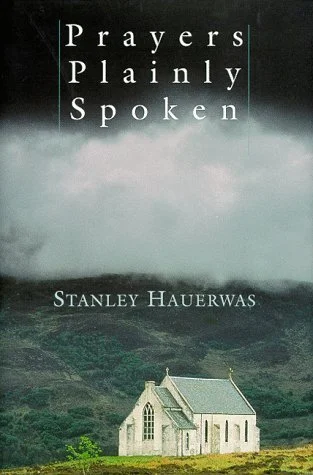Prayers Plainly Spoken
I love the cover photo on the original InterVarsity Press edition of Prayers Plainly Spoken by Stanley Hauerwas (later re-released by Wipf & Stock, with a different design). In the photo, we see an old stone church. Isolated. Ramshackle. The mountain landscape is shrouded in thick clouds—a layer of fog topped by a menacing gloom that threatens rain, or worse.
We know this building has endured some harsh weather. It’s unclear whether people continue to gather here to pray. But if there are still a few who do, the prayers in this profound collection from Hauerwas would be in their language. As the title of the book suggests, these are not polished prayers, nor are they overly pious. They are prayers for those who have endured stuff—prayers for those who no longer have the luxury of cliché.
Hauerwas, a theologian and ethicist who has written many scholarly and popular books, grew up in a working-class family in Texas. His father, a brick-layer, was the designated “pray-er” at extended family gatherings. And it was seen as a given that the younger Hauerwas would someday assume that responsibility. But praying spontaneously was not something that came naturally to him—not even after graduating from seminary and earning a PhD in theology. The written prayers of the church? Absolutely. His own ad-libbed offerings? Not so much. I’ll admit I can relate to that.
Joining the faculty of Duke Divinity School, and persuaded that he should start each class with a prayer, Hauerwas did the only thing he knew to do: he began writing prayers each morning before the students arrived. These prayers would often have to do with the day’s readings and lectures, or with recent world events, or the happy and sad occurrences in the life of their particular community of faith and learning.
Students began asking for copies of the prayers. Soon he was being encouraged to publish them. Hauerwas initially resisted making the prayers publicly available for the same reason he had been uncomfortable praying spontaneously: fear of praying to appear pious. I appreciate that impulse, even as I’m glad he eventually overcame his resistance.
In this collection are prayers about marriage, war and peace, chickens, hurricanes, Eucharist, fear, patience, and the deaths of students, colleagues, and pets. Profoundly biblical and theological prayers in profoundly plain language.
And then there’s the prayer he was invited to give before a Distinguished Professor’s luncheon. Hauerwas knew without being told that the university president was expecting something generic and predictable, the kind of prayer that wouldn’t offend or exclude. Because Hauerwas has been a vocal critic of watered-down civil religion—“A vague god vaguely prayed to serves no one well”—he initially declined the offer. But then he called back and said he’d do it after all. The prayer he wrote for the occasion is called “Addressing the God Who Is Not the ‘Ultimate Vagueness’” and it’s every bit as pointed as you’d imagine. (Due to his protest “and perhaps, prayer,” Hauerwas notes that the university has stopped having a prayer at this event.)
So no, Prayers Plainly Spoken is not a collection of polished, pious prayers. But neither are these prayers boring. Not by a long shot.
